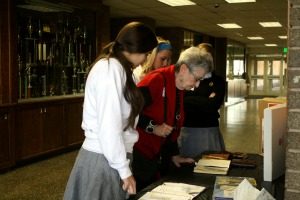Many people can trace their ancestry to someone famous like George Washington or royalty in other countries. My story is different. My family lost many lives and other families were destroyed in the worst genocide in the history of human kind: the Holocaust. Recently, JC took the senior class to the Holocaust museum. It is an extremely depressing museum, but my family will always be remembered there.
Before I tell my own story, I have to tell my grandmother’s story. My grandmother Shelly comes from Romania. She had a fine childhood. She tells me stories about participating in gymnastics and attending law school. Her brother was studying to be a doctor. Her parents owned a dry goods shop in Yassi, and they were happy. Then, the Holocaust happened.
As I walked through the Holocaust museum, I saw the story of my grandmother’s life during WWII. I saw photographs of people being lined up, shot, and dumped into a ditch. These are things she actually had to live through. After seeing those images, I question the morality of humankind, but if my grandmother can still see good in people so can I.
Her survivor story starts around 11 a.m. on the day when her life would be changed forever. In her house that morning, she heard a lot of noise coming from outside.
Her brother was home with her, and they both went outside to see what was going on. Soldiers forced her and her brother apart, lining the women and children of the village on one side of the street and the men on the other.
The men, including her brother and uncle, were taken on the cattle cars. My grandmother and her mother were let go. This was an example of a pogrom, an organized killing of a minority, in Romania.
According to my grandmother, if you tried to run, you were shot. If you tried to go see someone on the other side of the street, you were shot. Many women and children were shot, killed, and dumped in a trench that they had helped dig There is a small section in the museum that is dedicated to the pogroms. A small section, because in all honestly programs were not remotely as bad as the concentration camps, the crematoriums, or the death marches where millions lost their lives.
Her brother was never heard from again. We have yet to learn if he died on the cattle car, was shot along the way, was gassed to death, or was one of the millions who spent their last seconds in the crematorium. In the Holocaust museum there is a section where you can look for lost relatives to see what happened to them. I have been there twice and have yet to find his name.
I have family spread across the world from Romania to Israel. I have never met them and I probably never will. My family history was lost the minute Hitler decided to erase my family off the face of the planet.
I, however, am the lucky one. My grandmother was spared and my family is still alive, compared to the other families that were destroyed. During the Holocaust Remembrance Day I got to talk to many others whose families are similar to mine, but the most important speaker was Sol Goldstein, a liberator. It was a side that I had never heard before. I lived growing up with my family’s survivor story, but I never heard the side of a liberator. Goldstein talked about his job as a soldier and his horror at the sight of concentration camps. It had never hit me how awful it actually was during those times until I heard his story.
JC prides itself in educating their students to be well rounded. This is one of the many traditions that I love. It is important to me that JC keeps alive the memory of those lost by the Holocaust and reminds students how terrible it was for so many families.
Megan Foard is a Multimedia Editor for The Patriot and jcpatriot.com.



